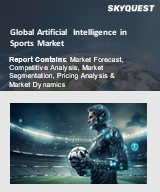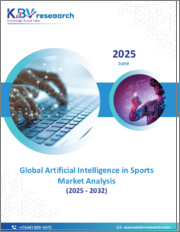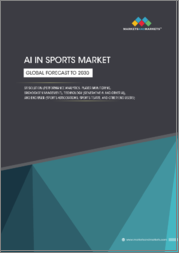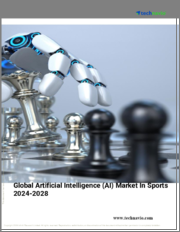
|
시장보고서
상품코드
1798031
스포츠용 AI 시장 예측(-203년) : 제공 제품별, 스포츠 유형별, 전개 모드별, 기술별, 용도별, 최종사용자별, 지역별 세계 분석AI in Sports Market Forecasts to 2032 - Global Analysis By Offering (Solutions and Services), Sports Type (Team Sports, Individual Sports and Esports), Deployment Mode, Technology, Application, End User and By Geography |
||||||
Stratistics MRC에 의하면, 세계의 스포츠용 AI 시장은 2025년에 55억 3,000만 달러를 차지하고, 예측 기간 중 연평균 복합 성장률(CAGR) 27.39%로 성장하여 2032년에는 301억 2,000만 달러에 이를 것으로 예측됩니다.
스포츠용 인공지능(AI)은 첨단 알고리즘, 머신러닝, 데이터 분석을 적용하여 경기력, 코칭, 관리, 팬과의 관계 등 다양한 측면을 강화하는 것을 말합니다. AI 시스템은 웨어러블 기기, 카메라, 센서에서 수집된 대량의 데이터를 처리하여 선수의 경기력을 분석하고, 결과를 예측하고, 전략을 최적화합니다. 부상 예방, 인재 스카우트, 개인 맞춤형 훈련 프로그램을 지원합니다. 또한, AI는 비디오 어시스턴트 레퍼리(VAR) 등의 기술을 통해 심판의 정확성을 높이고, 미디어용 스포츠 컨텐츠 제작을 자동화합니다.
첨단 게임 전략 최적화
코치나 선수는 이 기술을 통해 상대의 패턴, 강점, 약점을 즉각적으로 평가할 수 있습니다. AI 기반 인사이트는 경기 중 동적 조정을 통해 전반적인 경기력을 향상시킬 수 있습니다. 예측 모델링은 예상되는 경기 시나리오를 시뮬레이션하여 훈련 세션을 강화합니다. 이 기술은 데이터에 기반한 의사결정을 지원하고, 직관에만 의존하는 것을 줄여줍니다. 그 결과, 스포츠 조직은 경쟁 우위를 확보하고 AI 솔루션의 채택을 촉진할 수 있습니다.
데이터 프라이버시 및 보안에 대한 우려
기밀성이 높은 선수의 경기력 및 건강 데이터의 악용을 방지하기 위해서는 엄격한 보호가 필요합니다. 위반 및 무단 액세스의 결과로 선수, 팀, 조직은 신뢰를 잃을 수 있습니다. 복잡한 데이터 보호법을 준수하는 것은 시행을 더욱 어렵게 만듭니다. 이해관계자들은 이러한 우려 때문에 AI 솔루션의 전면적인 도입에 소극적인 태도를 보이고 있습니다. 그 결과, 시장 확대와 혁신의 둔화가 두드러지게 나타나고 있습니다.
웨어러블 & IoT 기기 도입 확대
웨어러블 & IoT 디바이스는 심박수, 운동 패턴, 피로도 등 방대한 데이터를 수집하고, AI가 이를 분석하여 실용적인 통찰력을 얻는다. 코치나 트레이너는 이 정보를 활용해 훈련을 최적화하고 부상을 예방하며 경기 전략을 개선할 수 있습니다. IoT 지원 기기는 인터랙티브한 경험과 실시간 통계를 통해 팬과의 소통을 강화하고 있습니다. 또한, 웨어러블과 AI의 통합은 개인화된 트레이닝 프로그램을 지원합니다. 이러한 기술적 시너지 효과로 인해 AI를 활용한 스포츠 솔루션에 대한 수요가 전 세계적으로 증가하고 있습니다.
기술 도입에 대한 저항
많은 스포츠 선수와 스포츠 단체는 기존 접근 방식에서 AI를 활용한 솔루션으로 전환하는 것을 꺼려합니다. 데이터의 프라이버시, 정확성, 신뢰성에 대한 우려로 인해 신뢰의 문제가 발생하고 있습니다. 기술적 노하우의 부족과 막대한 비용으로 인해 채택이 더더욱 어려워지고 있습니다. 전략 최적화, 부상 예방, 성과 분석에 AI를 적용하는 것은 이러한 주저함으로 인해 제약을 받고 있습니다. 그 결과, 시장 침투와 혁신이 늦어지게 됩니다.
코로나19의 영향
코로나19 사태는 스포츠용 AI 시장에 큰 혼란을 가져왔고, 훈련, 이벤트, 팬 참여에 영향을 미쳤습니다. 코로나19의 확산으로 인해 스포츠 이벤트가 중단되고 스포츠 활동이 줄어들면서 라이브 분석과 퍼포먼스 모니터링에 AI 도입이 늦어지고 있습니다. 그러나 이 위기는 원격 코칭, 가상 스포츠 시뮬레이션, AI를 활용한 팬과의 교류 도구에 대한 수요를 가속화했습니다. 팀과 조직은 한계에 적응하기 위해 예측 분석, 부상 예방, 디지털 참여에 AI를 활용하고 있습니다. 팬데믹은 결국 산업의 우선순위를 바꾸고, 스포츠 관리 및 팬 경험을 위한 AI 용도의 혁신을 촉진했습니다.
팀 스포츠 부문이 예측 기간 동안 가장 큰 비중을 차지할 것으로 예측됩니다.
팀 스포츠 부문은 팀 성과, 전략, 선수 발굴을 강화하기 위한 고급 분석에 대한 수요를 촉진하여 예측 기간 동안 가장 큰 시장 점유율을 차지할 것으로 예측됩니다. AI가 탑재된 도구는 코치나 분석가들이 실시간으로 선수들의 움직임, 피로도, 전술 패턴을 추적할 수 있도록 도와줍니다. 이러한 기술을 통해 팀은 훈련, 부상 예방, 경기 중 조정에 대해 데이터에 기반한 의사결정을 내릴 수 있습니다. 축구, 농구, 크리켓과 같은 스포츠의 인기는 경쟁에서 이기기 위해 AI 기반 솔루션에 대한 투자를 촉진합니다. 팀이 효율성과 성공률 향상을 추구함에 따라, 이 분야에서의 AI 도입은 계속해서 시장 성장을 가속화하고 있습니다.
팬 참여 부문은 예측 기간 동안 가장 높은 CAGR을 보일 것으로 예측됩니다.
예측 기간 동안 개인화된 컨텐츠, 실시간 통계, 인터랙티브 기능을 통한 시청자 경험 강화로 인해 팬 참여 부문이 가장 높은 성장률을 보일 것으로 예측됩니다. AI가 탑재된 툴은 팬들의 취향과 행동을 분석하여 타겟팅된 추천을 제공함으로써 시청자의 만족도를 높이고 있습니다. 소셜 미디어와의 통합과 AI를 활용한 챗봇은 팀과 서포터즈 간의 연결을 강화합니다. 예측 분석은 스포츠 조직이 팬들의 충성도를 높이기 위해 맞춤형 캠페인을 설계하는 데 도움이 됩니다.
가장 큰 점유율을 차지하는 지역
NFL, NBA, MLB, MLS와 같은 엘리트 리그가 경기력 분석, 부상 방지 도구, 팬 참여 시스템에 많은 투자를 하고 있기 때문입니다. 이 지역의 강력한 인프라, 미국과 캐나다의 심층적인 AI 연구 기반, 조기 도입 문화로 인해 머신러닝, 컴퓨터 비전, 예측 분석, 선수 모니터링, 방송 자동화, 가상 관전 기능, 실시간 스케줄링 최적화를 위해 머신러닝, 컴퓨터 비전, 예측 분석이 도입되고 있습니다. 새로운 개발로는 라이브 해설, 자동 하이라이트, 팬들에게 개인화되고 역동적인 컨텐츠를 제공하기 위한 AI 생성형 AI가 있습니다.
CAGR이 가장 높은 지역
예측 기간 동안 아시아태평양은 저렴한 웨어러블 센서, 컴퓨터 비전 분석, e-스포츠, 크리켓, 축구, 운동 훈련을 위한 향상된 AI 방송으로 인해 가장 높은 CAGR을 보일 것으로 예측됩니다. 현지 스타트업과 세계 하이테크 기업들은 소프트웨어 및 하드웨어 솔루션을 조정하기 위해 연구 개발 센터를 설립하고 있습니다. 주요 동향으로는 정부 지원 투자, e스포츠의 통합, 가상 팬 플랫폼, 훈련 및 방송에서 몰입형 경험을 위한 생성형 AI 등이 있습니다. 중국, 일본, 인도, 한국, 동남아시아 국가 등 신흥 경제권에서는 스마트폰과 인터넷이 보급되면서 스포츠에 AI 도입이 빠르게 진행되고 있습니다.
무료 커스터마이징 제공
본 보고서를 구독하는 고객에게는 다음과 같은 무료 커스터마이징 옵션 중 하나를 제공합니다.
- 기업 소개
- 추가 시장 진출기업의 종합적인 프로파일링(최대 3개사까지)
- 주요 기업의 SWOT 분석(3개사까지)
- 지역 세분화
- 고객의 관심에 따른 주요 국가별 시장 추정 및 예측, CAGR(주: 타당성 확인에 따라 다름)
- 경쟁사 벤치마킹
- 제품 포트폴리오, 지리적 입지, 전략적 제휴를 통한 주요 기업 벤치마킹
목차
제1장 주요 요약
제2장 서문
- 개요
- 이해관계자
- 조사 범위
- 조사 방법
- 데이터 마이닝
- 데이터 분석
- 데이터 검증
- 조사 접근
- 조사 자료
- 1차 조사 자료
- 2차 조사 자료
- 전제조건
제3장 시장 동향 분석
- 서론
- 성장 촉진요인
- 성장 억제요인
- 기회
- 위협
- 기술 분석
- 용도 분석
- 최종사용자 분석
- 신흥 시장
- COVID-19의 영향
제4장 Porter의 Five Forces 분석
- 공급 기업의 교섭력
- 바이어의 교섭력
- 대체품의 위협
- 신규 진출업체의 위협
- 경쟁 기업간 경쟁 관계
제5장 세계의 스포츠용 AI 시장 : 제공 제품별
- 서론
- 솔루션
- 서비스
제6장 세계의 스포츠용 AI 시장 : 스포츠 유형별
- 서론
- 팀 스포츠
- 개인 경기
- e스포츠
제7장 세계의 스포츠용 AI 시장 : 전개 모드별
- 서론
- On-Premise
- 클라우드 기반
제8장 세계의 스포츠용 AI 시장 : 기술별
- 서론
- 생성형 AI
- 머신러닝
- 컴퓨터 비전
- 자연언어처리
- 기타
제9장 세계의 스포츠용 AI 시장 : 용도별
- 서론
- 참여 기업 퍼포먼스 최적화
- 부상 예방 및 회복
- 게임 전략 및 스카우팅
- 팬 참여 및 퍼스널라이제이션
- 스포츠 베팅 및 판타지 인사이트
- 기타
제10장 세계의 스포츠용 AI 시장 : 최종사용자별
- 서론
- 프로 팀과 클럽
- 스포츠 아카데미
- 방송국 및 미디어
- 기술 제공업체
- 베팅 및 판타지 플랫폼
- 기타
제11장 세계의 스포츠용 AI 시장 : 지역별
- 서론
- 북미
- 미국
- 캐나다
- 멕시코
- 유럽
- 독일
- 영국
- 이탈리아
- 프랑스
- 스페인
- 기타 유럽
- 아시아태평양
- 일본
- 중국
- 인도
- 호주
- 뉴질랜드
- 한국
- 기타 아시아태평양
- 남미
- 아르헨티나
- 브라질
- 칠레
- 기타 남미
- 중동 및 아프리카
- 사우디아라비아
- 아랍에미리트(UAE)
- 카타르
- 남아프리카공화국
- 기타 중동 및 아프리카
제12장 주요 개발
- 계약/파트너십/협업/합작투자(JV)
- 인수와 합병
- 신제품 발매
- 사업 확대
- 기타 주요 전략
제13장 기업 프로파일링
- IBM Corporation
- SAP SE
- SAS Institute Inc.
- Sportradar AG
- Catapult Group International Ltd.
- Microsoft Corporation
- Oracle Corporation
- Stats Perform
- TruMedia Networks
- Hudl
- Genius Sports Group
- Synergy Sports Technology
- PlaySight Interactive
- Sportlogiq
- Zone7 Ltd.
- Pixellot Ltd.
- Veo Technologies ApS
- Clutch Technologies
According to Stratistics MRC, the Global AI in Sports Market is accounted for $5.53 billion in 2025 and is expected to reach $30.12 billion by 2032 growing at a CAGR of 27.39% during the forecast period. Artificial Intelligence (AI) in sports refers to the application of advanced algorithms, machine learning, and data analytics to enhance various aspects of athletic performance, coaching, management, and fan engagement. AI systems process large volumes of data from wearable devices, cameras, and sensors to analyze player performance, predict outcomes, and optimize strategies. It aids in injury prevention, talent scouting, and personalized training programs. Additionally, AI enhances officiating accuracy through technologies like video assistant referees (VAR) and automates sports content creation for media.
Market Dynamics:
Driver:
Advanced game strategy optimization
Coaches and players can evaluate opponents' patterns, strengths, and weaknesses instantly through this technology. AI-driven insights allow for dynamic adjustments during games, improving overall performance. Predictive modeling enhances training sessions by simulating possible game scenarios. This technology supports data-backed decision-making, reducing reliance on intuition alone. As a result, sports organizations gain a competitive edge, driving greater adoption of AI solutions.
Restraint:
Data privacy and security concerns
Strict protection is necessary to guard against misuse of sensitive athlete performance and health data. Players, teams, and organisations may lose trust as a result of violations or illegal access. Complying with intricate data protection laws makes implementation more difficult. Stakeholders are reluctant to fully embrace AI solutions because of these worries. As a result, there are notable slowdowns in market expansion and innovation.
Opportunity:
Growing adoption of wearable & IoT devices
The wearable & IoT devices collect vast amounts of data, including heart rate, movement patterns, and fatigue levels, which AI analyzes for actionable insights. Coaches and trainers use this information to optimize training, prevent injuries, and improve game strategies. IoT-enabled equipment enhances fan engagement through interactive experiences and live statistics. The integration of AI with wearables also supports personalized training programs. This technological synergy boosts demand for AI-driven sports solutions worldwide.
Threat:
Resistance to technology adoption
A lot of sportsmen and sports organisations are reluctant to switch from conventional approaches to AI-powered solutions. Trust problems arise from worries about data privacy, accuracy, and dependability. Lack of technical know-how and exorbitant expenses deter adoption even further. The application of AI for strategy optimisation, injury prevention, and performance analysis is constrained by this hesitancy. Consequently, market penetration and innovation are delayed.
Covid-19 Impact:
The Covid-19 pandemic significantly disrupted the AI in sports market, impacting training, events, and fan engagement. Lockdowns and restrictions led to event cancellations and reduced sports activities, slowing AI adoption in live analytics and performance monitoring. However, the crisis accelerated demand for remote coaching, virtual sports simulations, and AI-driven fan interaction tools. Teams and organizations increasingly used AI for predictive analytics, injury prevention, and digital engagement to adapt to restrictions. The pandemic ultimately reshaped industry priorities, fostering innovation in AI applications for sports management and fan experience.
The team sports segment is expected to be the largest during the forecast period
The team sports segment is expected to account for the largest market share during the forecast period by driving demand for advanced analytics to enhance team performance, strategy, and player development. AI-powered tools help coaches and analysts track real-time player movements, fatigue levels, and tactical patterns. These technologies enable teams to make data-driven decisions for training, injury prevention, and in-game adjustments. The popularity of sports like football, basketball, and cricket fuels investment in AI-based solutions to gain a competitive edge. As teams seek improved efficiency and success rates, AI adoption in this segment continues to accelerate market growth.
The fan engagement segment is expected to have the highest CAGR during the forecast period
Over the forecast period, the fan engagement segment is predicted to witness the highest growth rate due to enhanced audience experiences through personalized content, real-time statistics, and interactive features. AI-powered tools analyze fan preferences and behavior to deliver targeted recommendations, boosting viewer satisfaction. Social media integration and AI-driven chat bots foster stronger connections between teams and supporters. Predictive analytics help sports organizations design tailored campaigns to increase fan loyalty.
Region with largest share:
During the forecast period, the North America region is expected to hold the largest market share is driven by elite leagues like the NFL, NBA, MLB and MLS investing heavily in performance analytics, injury prevention tools, and fan engagement systems. The region's strong infrastructure, deep research base in AI from the U.S. and Canada, and early adoption culture enable deployment of machine learning, computer vision, and predictive analytics for player monitoring, broadcast automation, virtual spectator features, and real-time scheduling optimisation. Emergent developments include generative AI for live commentary, automated highlights, and dynamic fan personalised content delivery.
Region with highest CAGR:
Over the forecast period, the Asia Pacific region is anticipated to exhibit the highest CAGR is led by affordable wearable sensors, computer vision analytics, and enhanced AI broadcasting for esports, cricket, soccer and athletic training. Local start-ups and global tech firms are setting up R&D centers to tailor software and hardware solutions. Key trends include government-backed investments, esports integration, virtual fan platforms, and generative AI for immersive experiences in training and broadcasting. The regions emerging economies such as China, Japan, India, South Korea and Southeast Asian countries are rapidly adopting AI in sports through increased smartphone and internet penetration.
Key players in the market
Some of the key players in AI in Sports Market include IBM Corporation, SAP SE, SAS Institute Inc., Sportradar AG, Catapult Group International Ltd., Microsoft Corporation, Oracle Corporation, Stats Perform, TruMedia Networks, Hudl, Genius Sports Group, Synergy Sports Technology, PlaySight Interactive, Sportlogiq, Zone7 Ltd., Pixellot Ltd., Veo Technologies ApS and Clutch Technologies.
Key Developments:
In March 2025, IBM Consulting partnered with Scuderia Ferrari to relaunch their app as an AI driven fan platform, using watsonx to transform high-speed race data into immersive, personalized experiences for ~400 million fans. This also enhanced internal workflow efficiency.
In April 2025, SAS expanded its partnership with the Orlando Magic (NBA), integrating SAS Viya's advanced analytics to enhance personalized fan engagement, optimize ticket forecasting, and enable dynamic pricing strategies. Revealed at SAS Innovate 2025, the collaboration also introduced immersive AI-powered experiences, aiming to boost attendance, revenue, and fan satisfaction.
In February 2024, SAP formally unveiled AI-powered enhancements to its SAP Sports One platform in collaboration with German football clubs Hertha BSC and FC Bayern. These integrations use generative AI (LLMs) to automatically summarize scouting reports, compare players, and support multilingual workflows, streamlining talent recruitment during transfer windows
Offerings Covered:
- Solutions
- Services
Sports Types Covered:
- Team Sports
- Individual Sports
- Esports
Deployment Modes Covered:
- On-Premises
- Cloud-Based
Technologies Covered:
- Generative AI
- Machine Learning
- Computer Vision
- Natural Language Processing
- Other Technologies
Applications Covered:
- Player Performance Optimization
- Injury Prevention & Recovery
- Game Strategy & Scouting
- Fan Engagement & Personalization
- Sports Betting & Fantasy Insights
- Other Applications
End Users Covered:
- Professional Teams & Clubs
- Sports Academies
- Broadcasters & Media
- Technology Providers
- Betting & Fantasy Platforms
- Other End Users
Regions Covered:
- North America
- US
- Canada
- Mexico
- Europe
- Germany
- UK
- Italy
- France
- Spain
- Rest of Europe
- Asia Pacific
- Japan
- China
- India
- Australia
- New Zealand
- South Korea
- Rest of Asia Pacific
- South America
- Argentina
- Brazil
- Chile
- Rest of South America
- Middle East & Africa
- Saudi Arabia
- UAE
- Qatar
- South Africa
- Rest of Middle East & Africa
What our report offers:
- Market share assessments for the regional and country-level segments
- Strategic recommendations for the new entrants
- Covers Market data for the years 2024, 2025, 2026, 2028, and 2032
- Market Trends (Drivers, Constraints, Opportunities, Threats, Challenges, Investment Opportunities, and recommendations)
- Strategic recommendations in key business segments based on the market estimations
- Competitive landscaping mapping the key common trends
- Company profiling with detailed strategies, financials, and recent developments
- Supply chain trends mapping the latest technological advancements
Free Customization Offerings:
All the customers of this report will be entitled to receive one of the following free customization options:
- Company Profiling
- Comprehensive profiling of additional market players (up to 3)
- SWOT Analysis of key players (up to 3)
- Regional Segmentation
- Market estimations, Forecasts and CAGR of any prominent country as per the client's interest (Note: Depends on feasibility check)
- Competitive Benchmarking
- Benchmarking of key players based on product portfolio, geographical presence, and strategic alliances
Table of Contents
1 Executive Summary
2 Preface
- 2.1 Abstract
- 2.2 Stake Holders
- 2.3 Research Scope
- 2.4 Research Methodology
- 2.4.1 Data Mining
- 2.4.2 Data Analysis
- 2.4.3 Data Validation
- 2.4.4 Research Approach
- 2.5 Research Sources
- 2.5.1 Primary Research Sources
- 2.5.2 Secondary Research Sources
- 2.5.3 Assumptions
3 Market Trend Analysis
- 3.1 Introduction
- 3.2 Drivers
- 3.3 Restraints
- 3.4 Opportunities
- 3.5 Threats
- 3.6 Technology Analysis
- 3.7 Application Analysis
- 3.8 End User Analysis
- 3.9 Emerging Markets
- 3.10 Impact of Covid-19
4 Porters Five Force Analysis
- 4.1 Bargaining power of suppliers
- 4.2 Bargaining power of buyers
- 4.3 Threat of substitutes
- 4.4 Threat of new entrants
- 4.5 Competitive rivalry
5 Global AI in Sports Market, By Offering
- 5.1 Introduction
- 5.2 Solutions
- 5.3 Services
6 Global AI in Sports Market, By Sports Type
- 6.1 Introduction
- 6.2 Team Sports
- 6.3 Individual Sports
- 6.4 Esports
7 Global AI in Sports Market, By Deployment Mode
- 7.1 Introduction
- 7.2 On-Premises
- 7.3 Cloud-Based
8 Global AI in Sports Market, By Technology
- 8.1 Introduction
- 8.2 Generative AI
- 8.3 Machine Learning
- 8.4 Computer Vision
- 8.5 Natural Language Processing
- 8.6 Other Technologies
9 Global AI in Sports Market, By Application
- 9.1 Introduction
- 9.2 Player Performance Optimization
- 9.3 Injury Prevention & Recovery
- 9.4 Game Strategy & Scouting
- 9.5 Fan Engagement & Personalization
- 9.6 Sports Betting & Fantasy Insights
- 9.7 Other Applications
10 Global AI in Sports Market, By End User
- 10.1 Introduction
- 10.2 Professional Teams & Clubs
- 10.3 Sports Academies
- 10.4 Broadcasters & Media
- 10.5 Technology Providers
- 10.6 Betting & Fantasy Platforms
- 10.7 Other End Users
11 Global AI in Sports Market, By Geography
- 11.1 Introduction
- 11.2 North America
- 11.2.1 US
- 11.2.2 Canada
- 11.2.3 Mexico
- 11.3 Europe
- 11.3.1 Germany
- 11.3.2 UK
- 11.3.3 Italy
- 11.3.4 France
- 11.3.5 Spain
- 11.3.6 Rest of Europe
- 11.4 Asia Pacific
- 11.4.1 Japan
- 11.4.2 China
- 11.4.3 India
- 11.4.4 Australia
- 11.4.5 New Zealand
- 11.4.6 South Korea
- 11.4.7 Rest of Asia Pacific
- 11.5 South America
- 11.5.1 Argentina
- 11.5.2 Brazil
- 11.5.3 Chile
- 11.5.4 Rest of South America
- 11.6 Middle East & Africa
- 11.6.1 Saudi Arabia
- 11.6.2 UAE
- 11.6.3 Qatar
- 11.6.4 South Africa
- 11.6.5 Rest of Middle East & Africa
12 Key Developments
- 12.1 Agreements, Partnerships, Collaborations and Joint Ventures
- 12.2 Acquisitions & Mergers
- 12.3 New Product Launch
- 12.4 Expansions
- 12.5 Other Key Strategies
13 Company Profiling
- 13.1 IBM Corporation
- 13.2 SAP SE
- 13.3 SAS Institute Inc.
- 13.4 Sportradar AG
- 13.5 Catapult Group International Ltd.
- 13.6 Microsoft Corporation
- 13.7 Oracle Corporation
- 13.8 Stats Perform
- 13.9 TruMedia Networks
- 13.10 Hudl
- 13.11 Genius Sports Group
- 13.12 Synergy Sports Technology
- 13.13 PlaySight Interactive
- 13.14 Sportlogiq
- 13.15 Zone7 Ltd.
- 13.16 Pixellot Ltd.
- 13.17 Veo Technologies ApS
- 13.18 Clutch Technologies



















